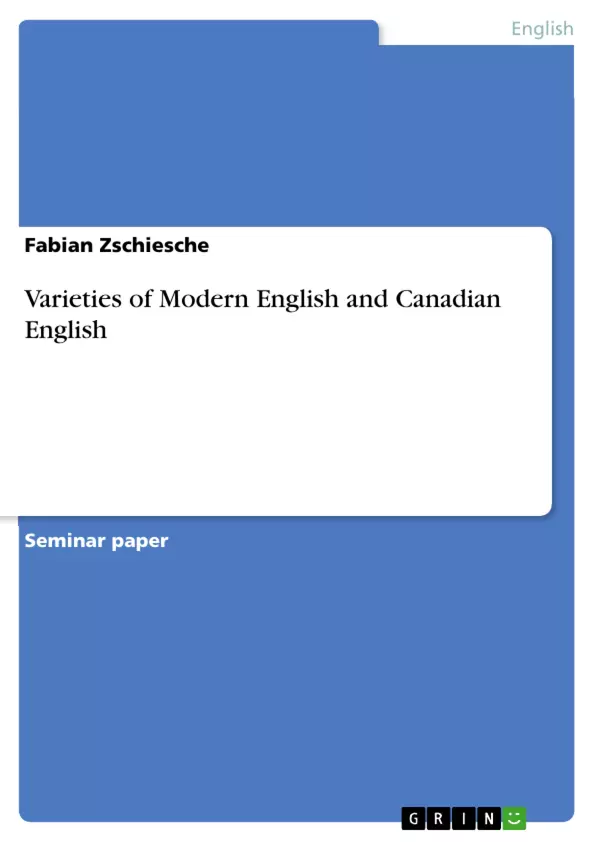In this text the author will try to explain what a variety of a language actually is and what other varieties of Modern English exist, before he goes into further detail explaining the origins of Standard Canadian English and its distinctive linguistic features which are in fact very difficult to detect if it is not known that they exist.
Inhaltsverzeichnis (Table of Contents)
- Introduction
- Different varieties of Modern English
- Variety vs. dialect and accent
- Short overview of different varieties
- Canadian English
- Standard Canadian English and its origins
- Distinctive spelling features
- Specific Canadian pronunciation
- Conclusion
Zielsetzung und Themenschwerpunkte (Objectives and Key Themes)
This paper investigates the characteristics of Canadian English as a distinct variety of Modern English. It aims to explain the origins of Standard Canadian English and identify its unique linguistic features, particularly in terms of spelling and pronunciation. The paper will also explore the relationship between Canadian English and other varieties of English, including American and British English.
- The definition and distinctions between language variety, dialect, and accent.
- The historical development and influences on Canadian English.
- The distinctive features of Canadian English in spelling, pronunciation, and vocabulary.
- The relationship between Canadian English and other varieties of English, such as American and British English.
- The impact of the linguistic landscape in Canada on the development and evolution of Canadian English.
Zusammenfassung der Kapitel (Chapter Summaries)
The first chapter introduces the topic of Canadian English and explores the unique linguistic landscape of Canada, highlighting the coexistence of English and French. It also raises the question of how Canadian English emerged as a distinct variety, setting the stage for the subsequent chapters.
Chapter two defines the terms "variety," "dialect," and "accent" and explains their differences. It then provides a concise overview of various Modern English varieties, highlighting their historical development and geographical distribution.
Chapter three delves into the specific characteristics of Canadian English. It discusses the origins of Standard Canadian English, tracing its historical roots and influences. It also examines the distinctive features of Canadian English in terms of spelling and pronunciation, analyzing key differences from other English varieties.
Schlüsselwörter (Keywords)
The paper focuses on key concepts such as language variety, dialect, accent, Standard Canadian English, Canadian pronunciation, distinctive spelling features, and the influence of British and American English on Canadian English. It also explores the impact of the linguistic landscape of Canada, including the presence of French and other indigenous languages, on the development of Canadian English.
Frequently Asked Questions
What defines Canadian English as a distinct variety?
Canadian English is characterized by unique origins and a blend of features that distinguish it from British and American English, specifically in spelling and pronunciation.
What is the difference between a language variety, a dialect, and an accent?
The paper explains that a variety is a broader term for a specific form of a language, while dialects involve grammar and vocabulary differences, and accents refer specifically to pronunciation.
What are the origins of Standard Canadian English?
The variety emerged from a complex historical landscape, influenced by British settlement, proximity to the United States, and the coexistence with the French language in Canada.
Are there specific spelling features in Canadian English?
Yes, Canadian English often features a mix of British and American spellings, making its distinctive patterns difficult to detect without specific linguistic knowledge.
How does Canadian pronunciation differ from other varieties?
The paper identifies specific phonetic traits that are unique to the Canadian context, contributing to its status as a recognized variety of Modern English.
- Citation du texte
- Fabian Zschiesche (Auteur), 2009, Varieties of Modern English and Canadian English, Munich, GRIN Verlag, https://www.grin.com/document/368117



